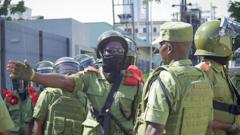In a recent statement, President Trump addressed the deportation of a group of migrants from various nations, revealing they were temporarily detained in Djibouti en route to South Sudan. This situation has raised significant legal and humanitarian concerns as the migrants’ fate remains uncertain.
Trump's Confirmation on Migrant Deportation to South Sudan

Trump's Confirmation on Migrant Deportation to South Sudan
President Trump's announcement highlights legal issues surrounding migrant deportations amidst humanitarian concerns.
On Thursday, President Trump confirmed that several migrants, including individuals from Vietnam, Cuba, and Mexico, found themselves stranded in Djibouti due to an ongoing legal dispute regarding their forced deportation to South Sudan—a country facing multiple conflicts and instability. The migrants, eight men in total, remain in limbo as their legal representation expressed deep concerns about their physical and mental well-being amidst the uncertainty of their situation.
A federal court in Boston issued a sharp rebuke against the government after the deportation was carried out, asserting it breached a court order that mandated immigrants receive adequate notice before being sent back to a nation that isn't theirs. Legal representatives rushed to court to halt the deportations, discovering that the Trump administration had previously categorized the destination information as "classified" during the proceedings.
In light of these controversies, Tricia McLaughlin, a spokesperson for the Department of Homeland Security, refused to disclose details about the flight or its destination under the guise of "operational security." As legal battles continue, the fate of these migrants remains unclear; the flight that transported them has already landed in Djibouti, prompting inquiries regarding their current detention conditions.
With humanitarian organizations observing the developments closely, the situation represents a significant clash between immigration policy and the protections afforded to individuals facing deportation. The ongoing legal challenges signify larger issues surrounding deportation practices under the current administration.
A federal court in Boston issued a sharp rebuke against the government after the deportation was carried out, asserting it breached a court order that mandated immigrants receive adequate notice before being sent back to a nation that isn't theirs. Legal representatives rushed to court to halt the deportations, discovering that the Trump administration had previously categorized the destination information as "classified" during the proceedings.
In light of these controversies, Tricia McLaughlin, a spokesperson for the Department of Homeland Security, refused to disclose details about the flight or its destination under the guise of "operational security." As legal battles continue, the fate of these migrants remains unclear; the flight that transported them has already landed in Djibouti, prompting inquiries regarding their current detention conditions.
With humanitarian organizations observing the developments closely, the situation represents a significant clash between immigration policy and the protections afforded to individuals facing deportation. The ongoing legal challenges signify larger issues surrounding deportation practices under the current administration.






















